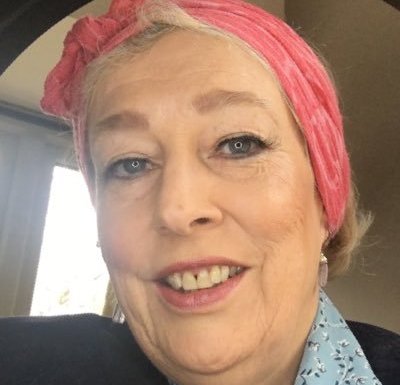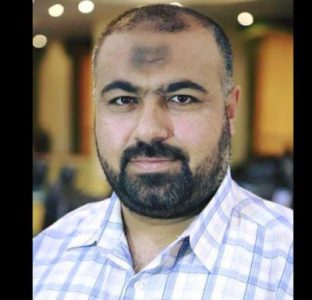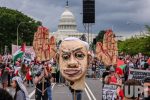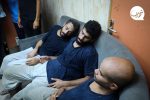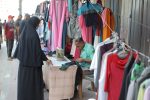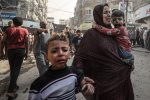Every single day I have spent in Gaza has been precious, but perhaps the most memorable experience there came on a special tour called the Night of the Martyrs. Our small group was privileged to visit the families and homes of those giants who may be gone but whose memories live on as if they are still alive.
And that’s the thing about Palestinians. Try as the Israelis might to destroy their lives, their culture, their stories and their legends, the real history of Palestine is passed on from generation to generation without a single detail spared. Each precious story is an affirmation that Palestine and the Palestinians exist, which is why they will never go quietly into the night. Indeed, that is why their keffiyeh is now worn globally, why their fine needlework and tapestry is worn and adorned everywhere; why dancing the dabke has travelled beyond the Levant; and why recipes for authentic Palestinian hummus abound.
I was reminded of the Night of the Martyrs during a recent search in my copy of the Holy Qur’an looking for a burst of inspiration for my general election campaign in Newcastle. A quick reference search into the pages of the Qur’an nearly always soon turns into a deep dive and this one took me to the Battle of Badr, when the following verse was revealed to the first generation of Muslims: “And say not of those slain in God’s way: ‘They are dead’; instead they are living; but you are not aware.” We Muslims believe that our Holy Book is the Word of God, and that He followed up this verse with a warning that something grave is going to happen to each and every one of us. “Surely, we will try you with something of fear and hunger, and diminution of goods and lives; yet give good tidings to the patient.” [Surat Al-Baqarah, verses 154-5]
Every word of that is applicable to Gaza, of course; and our Night of the Martyrs tour was proof that the martyrs still live, even in this world, for they came to life before me as the stories unfolded of their influence, presence and existence; everything was recounted in the finest of detail.
I never met the Lion of Palestine, Dr Abdel Aziz Al-Rantisi, the extraordinary resistance leader who was one of the seven co-founders of the Hamas movement in 1987. But I did meet his family and friends and they spoke in admiration and joy as though he was about to walk through the door of his home in Khan Younis at any minute. When I left I knew I’d been in the house of a great man, a legend with an unwavering commitment to standing up for his people and resisting the brutal and illegal Israeli occupation of their land.
Educated in an UNRWA school, Rantisi went to university in Egypt and returned in the 1970s as a qualified doctor. He went on to become the head of pediatrics at Nasser Hospital in 1976 but he was removed in 1983 by the Israeli occupation authorities and was arrested for the first time that year due to his anti-occupation activism; he organized a peaceful campaign to withhold paying taxes to the occupation authorities.
On 17 April 2004, less than a month after the assassination of the Islamic Resistance Movement’s elderly, wheelchair-bound spiritual leader, Sheikh Ahmed Yassin, his protege the Lion of Palestine, Rantisi, aged 56, was also killed by the Israeli military.
The village of Yibna where Rantisi was born in 1947 was one of hundreds to have been wiped off the map by the Zionist state (the details of this ethnic cleansing have been recorded meticulously by Dr Salman Abu Sitta), but generations of the Rantisi family know of its existence. He was six-months old when he and his family were forced to seek refuge in the Gaza Strip at the barrel of Israeli terrorist guns during the 1948 and ongoing Nakba. He grew up in a refugee camp in Khan Younis with his 11 siblings.
The injustices of the brutal Israeli military occupation were a daily reality.
When Rantisi was only nine, his uncle was killed by Israeli occupation soldiers in front of him. Unsurprisingly, that had a major impact on his life.
When asked about his own death after the assassination of Sheikh Yassin, knowing that he was undoubtedly on Israel’s hit list, he said scornfully: “It’s death, whether by killing or by cancer. Nothing will change. If by Apache [helicopter gunship] or by cardiac arrest, I prefer Apache.” Rantisi got his wish and was martyred along with his bodyguard and his 27-year-old son Mohammed; all were killed by a missile fired at their car by an Israeli helicopter.
Rantisi was arrested numerous times and jailed for several years. While in prison he memorized the whole Qur’an and was among the 415 Palestinian resistance figures deported by Israel to a bleak patch of no-man’s-land on the Israel-Lebanon border in 1992.
Looking back over the past 240 genocidal days which have exposed the evil of Israel and Zionism, I wonder how many Palestinian children in Gaza will also be “lions of Palestine” in the future. The Israelis need to know that they can’t wipe an entire nation off the map, not least the Palestinians, who love life, love their children and want nothing more for them than freedom and justice.
It has been observed wryly by Hamas fighters on several occasions: “They tried to bury us; They didn’t know that we were seeds.” In the end, oppressors will understand that they can’t destroy people who have a great story to tell; one of survival, joy for life and freedom, because the oppressed will always plant their seeds, knowing that one day they will bloom.
On that same Night of the Martyrs, we were taken on several other visits to other homes where a family member had willingly paid the ultimate price in the entirely legitimate struggle for freedom. In one yard we were shown the crushed wheelchair of the revered martyr Sheikh Yassin himself.
It was explained to us how he and his entire family fled to Gaza, settling in Al-Shati (Beach) Refugee Camp after his village was ethnically cleansed by Zionist terrorists during the 1948 Nakba. He suffered severe spinal injuries at the age of 12, apparently while wrestling with a friend. Although written off as a paraplegic, Yassin was gifted with a brilliant mind and he immersed himself in the pages of the Holy Qur’an. Despite his obvious disabilities he became an intellectual giant in the Islamic world and a revered figure whose words of wisdom inspired an entire generation in Gaza.
Sheikh Ahmed Yassin’s legacy is still very much alive.
The seeds sown by he and his colleagues, including Rantisi, have bloomed into the current generation of resistance fighters who strike fear into the hearts of Israeli soldiers. In one video on social media a sergeant in Israel’s elite Golani Brigade said: “We are fighting ghosts. Get us out of this fight. If the battle continues, our army will be annihilated.”
The Hamas fighters are inspired by the courage of the older generation who have proved to be equally unbreakable and resilient. The heirs of the original Nakba generation survive today in Gaza without food and water and refuse to leave their land. “To be truly free, you must overcome the love of wealth and the fear of death,” said Dr Martin Luther King Jr. “If a man has not discovered something he will die for, he isn’t fit to live.”
Sheikh Yassin won’t be surprised at the way his people are being tested with fear, hunger, thirst and loss of property. As we know, the God-fearing people of Gaza are being tested with their lives and their reaction to this war has inspired a new generation of converts to Islam in the West. I am certain that the Sheikh is grateful to his Lord for this blessing.
As I continued my research about him, I came across this video clip of an interview with Sheikh Yassin in which he predicted the end of the Zionist state of Israel by 2027. He believed that it is all down to cycles of 40 years: The 1948 Nakba was the start of the first 40 years; the second 40 years was the start of the resistance and uprisings; and the third 40 years will see the gradual downfall and end of Israel. “Because our Lord decreed upon Bani Israel that they [had to] wander around Sinai for 40 years due to their arrogance and disobedience of their Prophet Moses. Why 40 years? To change an ill generation, it takes 40 years.”
He concluded by suggesting that the current generation of Palestinians will be the generation that will sacrifice their lives and end the Israeli oppression “if Allah wills”. In other words, they are the seeds planted in Palestine’s past that are coming into bloom today.
-British journalist and author Yvonne Ridley provides political analysis on affairs related to the Middle East, Asia and the Global War on Terror. Her work has appeared in numerous publications around the world from East to West from titles as diverse as The Washington Post to the Tehran Times and the Tripoli Post earning recognition and awards in the USA and UK. Ten years working for major titles on Fleet Street she expanded her brief into the electronic and broadcast media producing a number of documentary films on Palestinian and other international issues from Guantanamo to Libya and the Arab Spring. Her article appeared in MEMO.

